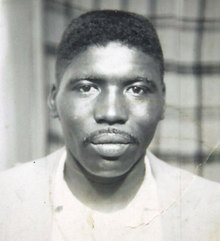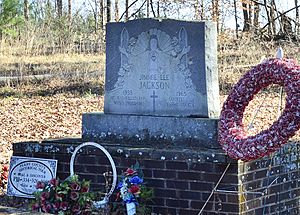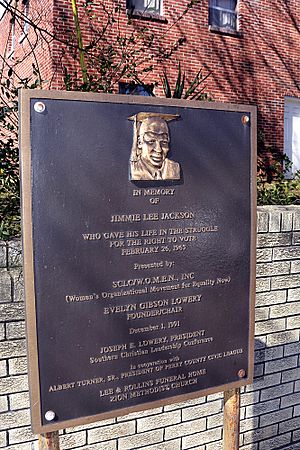Murder of Jimmie Lee Jackson facts for kids
Quick facts for kids
Jimmie Lee Jackson
|
|
|---|---|
 |
|
| Born | December 16, 1938 Marion, Alabama, U.S.
|
| Died | February 26, 1965 (aged 26) Selma, Alabama, U.S.
|
| Cause of death | Gunshot |
| Occupation | Farmer |
| Organization | Southern Christian Leadership Conference (SCLC) |
| Movement |
|
Jimmie Lee Jackson (born December 16, 1938 – died February 26, 1965) was an African American civil rights activist. He lived in Marion, Alabama, and was a deacon in his Baptist church.
On February 18, 1965, Jimmie Lee was taking part in a peaceful march. The march was to help people get the right to vote. During this event, an Alabama state trooper shot him. Jackson died eight days later in the hospital.
His death helped start the famous Selma to Montgomery marches in March 1965. These marches were a big part of the Civil Rights Movement. They helped lead to the Voting Rights Act of 1965. This important law made it possible for millions of African Americans to vote again. They could finally take part in the political system, something they hadn't been able to do for many years.
In 2005, a former state trooper named James Bonard Fowler said he had shot Jackson. He claimed it was in self-defense. In 2010, he admitted to a lesser charge related to Jackson's death. He was sentenced to a short time in prison.
Contents
Early Life and Family
Jimmie Lee Jackson was born in 1938 in Marion, Alabama. This town was the main city of Perry County. His parents, Jimmie Lee and Viola Jackson, were a farming family. They all belonged to the Baptist church. Jimmie Lee was named after his father.
When Jackson was 18, his father passed away. Jimmie Lee then took over working on and managing the family farm. He also had a daughter.
A Deacon and Activist
After living in Indiana for a while, Jackson moved back to his hometown. He worked as a laborer and a woodcutter. He earned six dollars for each day he worked. In the summer of 1964, Jackson became the youngest deacon at St. James Baptist Church in Marion.
Jackson had tried to register to vote for four years. But he was never successful. This was because of unfair rules in Alabama that made it hard for African Americans to vote. His mother, Viola, and his grandfather, Cager Lee, also tried to register. They also failed.
Jackson was inspired by Martin Luther King Jr.. King and other staff from the Southern Christian Leadership Conference (SCLC) came to nearby Selma, Alabama. They wanted to help local activists with their voter registration efforts. Jackson went to meetings several nights a week at Zion's Chapel Methodist Church.
The Attack and Shooting
On the evening of February 18, 1965, about 500 people gathered. They were organized by C. T. Vivian, an SCLC activist. They left Zion United Methodist Church in Marion. They planned a peaceful walk to the Perry County jail. The jail was only about half a block away. A young civil rights worker named James Orange was being held there. The marchers planned to sing hymns and then return to the church.
The marchers included Jackson, his 16-year-old sister Emma Jean, his mother, and his grandfather Cager Lee. When they reached the post office, they met a line of police officers, sheriff's deputies, and state troopers. During this tense moment, the streetlights suddenly turned off. The police then began to hit the protesters. The marchers turned and ran back toward the church.
Jackson was shot by the troopers. He was taken to the hospital, but he died.
Jackson was honored at his memorial service. People spoke of him as a hero who died for a good cause. He was buried in Heard Cemetery, an old burial ground. His headstone was paid for by the Perry County Civic League. Over the years, his headstone has been damaged.
What Happened Next
Two memorial services were held for Jimmie Lee Jackson. Martin Luther King Jr. spoke at one of them. He said that Jackson's death should inspire everyone to work for a better America. He also said people should not be angry or use violence.
Because of Jackson's death and other violence, James Bevel started the first of the Selma to Montgomery marches. Bevel was the director of SCLC's Selma Voting Rights Movement. The marches were a way for people in Marion and Selma to show their anger. They wanted to work for a positive change. They also wanted to draw attention to the need for voting rights reform.
The first march happened a few days later, on March 7, 1965. It became known as "Bloody Sunday." State troopers and the county sheriff's group attacked and beat the protesters. This happened after they crossed the Edmund Pettus Bridge. The events were shown widely on TV and in newspapers. This brought a lot of attention and support for the voting rights campaign. The government then promised to protect the marchers.
In the third march to Montgomery, which started on March 21, federal troops protected the protesters. They marched the entire way, and more people joined them. A total of 25,000 people peacefully entered the city. This was the largest civil rights event in the city at that time.
In March 1965, President Lyndon B. Johnson announced a new federal bill. This bill would help protect voting rights. It would allow the federal government to oversee local voting practices. Congress passed this bill, and it became the Voting Rights Act of 1965. After the act was passed, Jimmie Lee Jackson's grandfather, Cager Lee, was finally able to register and vote. He had marched with Jimmie Lee in February 1965. He was 84 years old when he voted for the first time.
In 2015, the Marion to Selma Connecting Trail was created. This trail links the Selma to Montgomery National Historic Trail to the place where Jackson died.
Jimmie Lee Jackson in Movies
Jimmie Lee Jackson's story has been told in movies. In the 2014 drama film Selma, he was played by Lakeith Stanfield. This movie shows the civil rights events in 1965 in Selma. It includes Jackson's death and the marches.
Jimmie Lee Jackson was also played by Zachary Rogers in the 1999 film Selma, Lord, Selma. This movie tells the story of Bloody Sunday. It is seen through the eyes of 11-year-old Sheyann Webb-Christburg.
 | Delilah Pierce |
 | Gordon Parks |
 | Augusta Savage |
 | Charles Ethan Porter |



